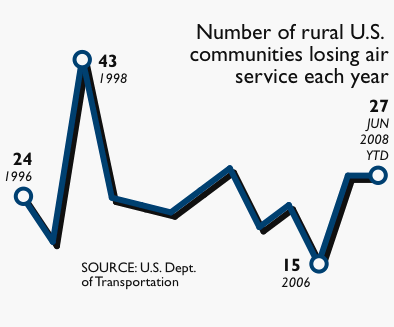Turbulence hit the state’s rural airline service this summer, as flight service was reduced or canceled in several communities, leaving in its wake concern that businesses and economic development will be harmed.
STATEWIDE Turbulence hit the state’s rural airline service this summer, as flight service was reduced or canceled in several communities, leaving in its wake concern that businesses and economic development will be harmed.
Citing spiking fuel prices, Horizon Air has told the U.S. Department of Transportation that it wants to eliminate its three daily Pendleton-Portland flights and replace them with two flights to Seattle. Horizon, under the Essential Air Service (EAS) program, gets $748,000 to help subsidize that service. The subsidy program helps entice air service to rural communities.
The DOT denied the request until it finds a replacement. Horizon also said it plans to terminate flights to Portland from Klamath Falls and North Bend-Coos Bay (it receives no subsidies for those markets).
“Horizon has been telling us for five years that this would happen,” says Larry Dalrymple, Pendleton’s economic development director. Horizon, along with other regional carriers around the country, has replaced its 17-30 seat planes with 76-passenger planes and those additional seats are harder to fill in the short-haul markets.
There were other blows to rural service this summer: United plans to scale back service in Medford and Eugene; Delta plans to cut its Eugene to Los Angeles nonstop and also reduce its service in Salem; and US Airways Express will stop service in and out of Medford. Some good news for North Bend-Coos Bay was the Skywest United Express flights that began in July to San Francisco International Airport. Horizon’s departure in October from the Southwest Oregon Regional Airport leaves Skywest as the only carrier in North Bend.
Dan Clem, director of the Oregon Department of Aviation, says the state is most concerned about the service cutbacks in North Bend and Klamath Falls and that he is talking to the Oregon Economic and Community Development Department about support options.
 The cutbacks “sent shock waves through Oregon; and Washington is in the same boat,” says Bob Noble, executive director of the Oregon Airport Management Association. He says the short hauls that serve rural areas generally are not profitable and need a subsidy, and the right size of smaller aircraft are not available to allow a willing carrier to fill the gap. Most airlines, such as Horizon, are purchasing more profitable 70 or 90-seat aircraft. “This storm was coming without the fuel problem,” he says.
The cutbacks “sent shock waves through Oregon; and Washington is in the same boat,” says Bob Noble, executive director of the Oregon Airport Management Association. He says the short hauls that serve rural areas generally are not profitable and need a subsidy, and the right size of smaller aircraft are not available to allow a willing carrier to fill the gap. Most airlines, such as Horizon, are purchasing more profitable 70 or 90-seat aircraft. “This storm was coming without the fuel problem,” he says.
Small towns across the country are facing similar cutbacks. The federal DOT reports that so far this year airlines have asked to cut service to 27 rural communities subsidized by the EAS program, including the three in Oregon. If those requests are finalized, it would mean that since 1996, 320 rural communities nationwide have lost their air service.
“I think you are going to see wholesale cancellation of rural flights, accelerated by fuel costs,” says Maurice Parker, executive director of Regional Aviation Partners, a national lobbying group. The group says that, since 2001, the number of carriers serving EAS communities has declined by 40%. Since May 2007, 48 of 106, or 45%, of EAS communities have had a 90-day termination notice filed by the air carrier serving their community.
As the lady said, fasten your seat belts. It’s going to be a bumpy ride.
ROBIN DOUSSARD
Have an opinion? E-mail [email protected]


